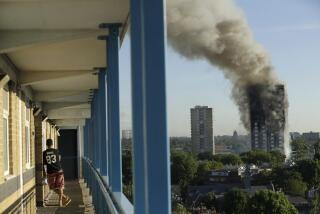Giuliani Defends City’s Sept. 11 Response
- Share via
NEW YORK — Testifying Wednesday before the commission investigating the World Trade Center attack, former New York Mayor Rudolph W. Giuliani defended emergency response efforts, telling panel members: “There was not a problem of coordination on Sept. 11, 2001.”
His comments, which provoked anger from victims’ kin, were in response to a panel report that detailed a host of failures that day -- including poor communication and rivalries between police and firefighters, and deficiencies in the 911 telephone network.
“Blame should be directed at one source and one source alone: the terrorists who killed our loved ones,” Giuliani said.
But he at times was drowned out by outbursts from family members, who demanded tougher questioning of witnesses.
“We hear lies!” someone shouted.
Sally Regenhard -- whose firefighter son died when two hijacked planes flew into the trade center’s twin towers, collapsing them -- yelled at the former mayor: “My son was murdered because of your incompetence!” She held up a sign that read “Fiction” as Giuliani praised New York’s response to the worst case of terrorism on domestic soil.
The anger directed at Giuliani came on the second day of hearings in New York by the panel, which is charged with investigating the attacks and recommending ways to avoid future terrorism. The hearings are to resume in Washington on June 8, and the final report is due July 26.
The former mayor, who like New York City firefighters became a symbol of heroism for his steady response to the disaster, was praised by panel members on Wednesday.
“New York City ... in a sense was blessed because it had you as leader,” said commission Chairman Thomas H. Kean. “It had somebody who was a great, great leader to take charge of a terrible, terrible event. You also had, as you’ve told us, some of the best people in the country to call on who worked for you and worked for the city.”
Giuliani’s positive assessment of emergency response efforts the day of the attack went virtually unchallenged Wednesday by the 10-member bipartisan panel.
That was in marked contrast to the interrogation of his top emergency officials Tuesday. Panelist John F. Lehman, who was Navy secretary under President Reagan, had called the command-and-control problems at the World Trade Center complex scandalous. “It’s not worthy of the Boy Scouts, let alone this great city,” he said Tuesday.
Ex-Fire Commissioner Thomas Von Essen afterward called Lehman’s comments “outrageous.”
In a joint statement after Wednesday’s hearing, former New Jersey Gov. Kean and former Indiana Rep. Lee H. Hamilton, the panel’s vice chairman, reiterated the report’s findings.
While expressing “profound admiration” for the first responders, the commission said that effective decision-making in New York was hampered by “poor communications across agencies.... Fire chiefs did not know what the NYPD knew, and knew less than what TV viewers knew.”
The commission said that 911 operators and Fire Department dispatchers did not pass onto rescuers information they learned from callers trapped in the twin towers.
More than 2,700 people died in the attack on the 110-story buildings, including 343 firefighters.
Giuliani told the commission that during his administration, city officials had conducted numerous drills to simulate terrorist attacks, but hijacked planes flying into the center were never anticipated.
The former mayor said that preparedness had focused on protecting bridges, tunnels and subways and responding to biological or chemical attacks. “We did not think about planes being used as a missile,” he said.
Giuliani said he never was informed about an Aug. 6, 2001, intelligence briefing prepared for President Bush titled “Bin Laden Determined to Strike in U.S.” The document warned of terrorists scouting New York City buildings and mentioned the trade center three times.
But even if he had learned of its contents, Giuliani said, New York officials probably would not have changed security measures. “We were doing everything we could think of to protect the city,” he said.
Giuliani’s successor, Mayor Michael R. Bloomberg, on Wednesday told the commission that steps had been taken since the attack to improve communications between the police and fire departments -- including new and more powerful radios that allow fire and police commanders to talk directly with their counterparts.
Like Giuliani, he praised the first responders.
“The armchair quarterbacks forget that New York City [officials] work together hundreds of times a day,” the mayor said. “Although much has been made of the so-called battle of the badges, these are isolated episodes that are the result of individual, low-level breakdowns in discipline.”
Bloomberg said the city’s budget for the next fiscal year contained $1 billion for a comprehensive overhaul of the 911 dispatch system.
The mayor also said that, even though terrorists had targeted the city six times since 1993, New York ranked 49th among the 50 states in per capita homeland security funding during the 2004 fiscal year -- receiving only $5.47 for each person, while Wyoming got $38.31 and American Samoa $101.43.
“This is pork-barrel politics at its worse,” he said. “It also, unfortunately, has the affect of aiding and abetting those who hate us and plot against us.”
More to Read
Sign up for Essential California
The most important California stories and recommendations in your inbox every morning.
You may occasionally receive promotional content from the Los Angeles Times.










